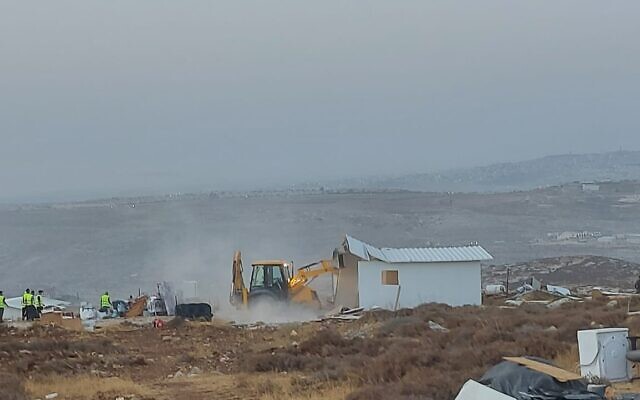The far-right Religious Zionism party is set to be granted extensive influence over the Israeli government’s civilian activities in the West Bank, from appointing key officials to providing final approvals for building and demolitions in a majority of the territory, according to a copy of the partial coalition deal released Monday.
The agreement reveals further details relating to the powers that will be given to the Religious Zionism-appointed minister in the Defense Ministry in charge of “Jewish settlement and open lands,” a position that was announced by a party spokesman when the deal was signed with Benjamin Netanyahu’s Likud party last week.
The agreement states that the minister appointed to the role, reportedly likely to be Religious Zionism leader Bezalel Smotrich, will act with the coordination and agreement of the prime minister.
However, the minister will play a key role in managing life for Palestinians and Israeli settlers in much of the West Bank.
This minister will have the authority to appoint the heads of the powerful Coordinator of Government Activities in the Territories (COGAT) and the Civil Administration, responsible for the government’s civil policy within the West Bank, as revealed by a copy of the deal (Hebrew).
Get The Times of Israel's Daily Edition by email and never miss our top stories
The appointments will be made “in coordination and agreement” with expected incoming prime minister Netanyahu. Previously, these positions were filled by the defense minister, upon recommendation from the Israel Defense Forces chief of staff.
In vaguely worded language, the agreement — a role-focused annex to an expected forthcoming full coalition agreement — stated that this minister will also “receive full authority over the areas of operation of COGAT and the Civil Administration.”

Likud party leader Benjain Netanyahu, right, and Religious Zionism party leader Bezalel Smotrich sign a coalition deal in Jerusalem on December 1, 2022. (Likud)
Prime Minister Yair Lapid attacked the agreement for allowing a minister to appoint the positions rather than the Israel Defense Force’s chief of staff.
“Netanyahu sold the IDF to the hardalim,” Lapid tweeted, using a word to denote ultraconservative, ultra-religious Israelis.
A number of former Israeli politicians and senior IDF officers have also railed against the agreement for giving Smotrich extensive powers over Israeli settlements and Palestinian daily life.
The Religious Zionism party did not respond to a request to fully clarify the responsibilities granted it under the agreement.
COGAT deals mainly with aspects of Palestinian life where they intersect with Israel. The body is responsible for granting Palestinians entry permits into Israel, coordinates the transfer of aid and other goods into Gaza and the West Bank, and liaises with the Palestinian Authority on other matters.
The Civil Administration, which is part of COGAT, has control over planning and construction in Area C of the West Bank, an area comprising some 60 percent of the territory that is home to all of Israel’s 491,000 settlers and tens of thousands of Palestinians. The body authorizes construction both in Israeli settlements and for Palestinians and carries out enforcement against illegal construction by both.
Confirming details reported on Thursday, the agreement states the minister will also sit atop the West Bank’s planning commission, which approves new construction in Area C, the part of the West Bank under Israeli civil and military control and home to all Jewish settlement.
Currently, the defense minister provides final approval, but this authority will move to Religious Zionism “in coordination and agreement” with expected incoming prime minister Netanyahu.
Smotrich is a longtime advocate for increased settlement building, including the retroactive authorization of illegal wildcat outposts. He has also led efforts to lobby for upped enforcement against unauthorized Palestinian building, which right-wing organizations claim is part of a Palestinian Authority plan to create a de facto territorially contiguous Palestinian state, which they resolutely oppose.
Palestinians argue that Israel almost never grants construction permits outside of settlements, forcing them to build illegal structures to keep up with natural population growth.
The Religious Zionism election platform calls for the retroactive authorization of some 70 unauthorized settlement outposts where approximately 25,000 settlers live, and sets itself a goal of bringing another one million settlers to the West Bank by reducing the bureaucratic process required for new settlement construction.

Security forces from the Civil Administration and the police demolish one of the homes in the illegal settlement outpost of Ramat Migron on August 30, 2022. (Courtesy Ramat Migron settlers)
It also calls for intensified efforts to map out land ownership in the West Bank in order to enable the declaration of more land as state-owned, where settlements can be built.
While the international community considers all settlement activity illegal in the West Bank, which Israel captured from Jordan in the 1967 Six Day War, Israel differentiates between legal settlement homes built and permitted by the Defense Ministry on land owned by the state, and illegal outposts built without permits, often on private Palestinian land.
Religious Zionism has said it hopes to change the situation by extending Israeli sovereignty over parts or all of the West Bank. Critics have said that giving so much authority to a party pushing this policy agenda may lead to de facto annexation.
Netanyahu is sensitive to international attention on the issue, reportedly citing US concerns when denying Smotrich the Defense Ministry portfolio. The Likud chief is also said to have been concerned by Smotrich’s extreme positions and lack of security experience.
That being the case, Netanyahu has said that all moves will be made in coordination with the prime minister, and will himself chair the government’s committee on settlement.
Nonetheless, the Religious Zionism minister will receive a full, 12-person independent office within the Defense Ministry, and oversee an additional three legal advisers.
Likud has said that it wants to convert ministry legal advisers, whose role is to advise and sometimes constrain ministry activity, to positions of trust, appointable and dismissible at will.
Religious Zionism has said it has not yet determined which of its lawmakers will fill the role in the Defense Ministry, although reports say it may be Smotrich.

Construction work in the Israeli settlement of Givat Zeev, near the Palestinian city of Ramallah in the West Bank, on October 28, 2021. (Ahmad Gharabli/AFP)
Smotrich is also slated to serve as finance minister in rotation, expected to swap the post for that of interior minister with Shas leader Aryeh Deri halfway through the government’s term, once the government passes legislation to grant Deri a cabinet spot despite his suspended sentence handed down earlier this year for tax offenses.
Smotrich is also set to pick up the Health Ministry or another to be determined between himself and Likud once the rotation happens, according to the agreement.
Religious Zionism will also take control of the Immigration and Absorption Ministry and the Settlements Ministry, which will be reframed as the National Missions Ministry and receive expanded powers.
Among them, the National Missions Ministry will receive departments related to Jewish identity from the Education and Religious Services ministries.
Religious Zionism will also get to appoint a number of representatives to a council that oversees some state-funded religious schools.
Religious Zionism will also receive control over the Knesset’s constitutional committee and a committee for infrastructure projects and reforms.
The latter committee has a crossover in responsibilities with the Knesset’s Finance Committee and Internal Affairs Committee, with the move reportedly causing conflict with their United Torah Judaism party chairs.
Haredi news site Behadrei Haredim reported that UTJ officials were surprised by the agreement on Monday, and that it might affect their ongoing coalition negotiations with Likud.
Party senior official Moshe Gafni said during a Finance Committee meeting on Monday morning that the plan “harms the Knesset’s work” and that he would try to convince Netanyahu to walk back the decision.
Jeremy Sharon and Times of Israel staff contributed to this report.


